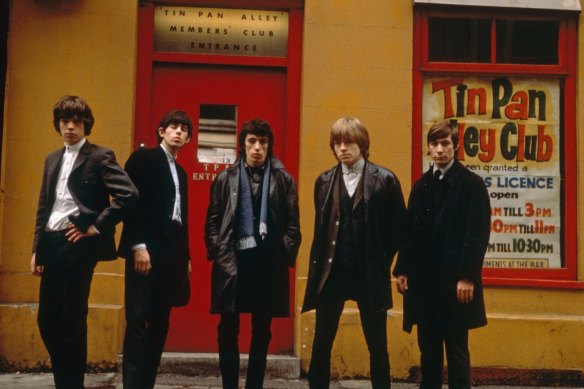Brian Jones, rock and roll’s first lost boy, and the sad letter from his dad
The mystery that had nagged at the filmmaker all these decades went deeper, into the tormented head of a man who, despite having the world at his feet, would allow that self-destructive streak to consume him.
The humiliation of being ousted by manager Andrew Loog Oldham as leader of the Stones in favour of songwriters Richards and Mick Jagger clearly cut Jones deeply. But more than the painstakingly sourced unseen footage, it’s a trove of personal letters between the exceptionally gifted musician and his disapproving parents that are most revealing in the film. “There’s been a lot of letters auctioned, written to Brian and from Brian, and one of the letters which was found in the attic of a house where he had been living was that very sad one from the father,” Broomfield says.

The Rolling Stones outside the Tin Pan Alley Club in London, 1963. Credit: Getty Images
Written too late in the young man’s life, it expresses Lewis Jones’ profound regret at failing to understand his son’s passion. Brian was kicked out of home in the Stones’ early years. His hopeful invitations to his parents to come and see them perform were always ignored.
“It cemented a lot of feelings I had about him,” the filmmaker says, “and what the focus of the film should be: that relationship with his parents and the way it dogged him for his whole life. Although he had created this enormously successful band, he was still the little kid who wanted approval. “At that time, of course, there was very little psychological examination of anything. I think his father realised much too late what had gone wrong.”
In Broomfield’s account, this is the tragic irony of Jones’s life: that the generational rebellion that set kids like him free had condemned its instigator to a lost and loveless end. It ties into a larger subtext of the film, about the consequences of a movement that cluelessly assumed that freedom could be had for free.
“Yeah, it was all about doing your own thing, and if you followed freedom, and you pushed the balloon out as far as possible, it would all work out. There was no real room for doubt,” Broomfield says. “Brian went, then Hendrix went, then there was a sort of domino effect.”
Altamont, the December ’69 Rolling Stones concert in which a young man was stabbed to death by Hells Angels hired by Jagger as “security”, is often cited as the symbolic end of the ‘60s dream. But the young Nick Broomfield witnessed its last gasp five months earlier, when the Stones played a free concert in London’s Hyde Park, just after Jones’ death.
“I knew Brian was dead, but I didn’t realise it was going to be his obituary,” he says. “It didn’t altogether work. They were pretty rusty. They hadn’t really played for a couple of years. And the whole thing with Jagger releasing the butterflies was incredibly painful. A lot of dead butterflies on the stage… It was obviously the end of that enchanting naivety of the era.”
Loading
But “you don’t have to be a Rolling Stones fan,” he says, to feel the sadness at the heart of this story. “A lot of people have trouble with living up to their fathers’ expectations, so it seemed to me a universal story that a lot of people could relate to.
“The more interesting rock films, like the one about Dylan, Don’t Look Back, they’re not just a soft portrait of an artist and their best songs. There’s a deep character study that people can relate to, and they’re also a portrait of that time,” Broomfield says. “The values and culture of that time that enabled certain forms of behaviour to exist, that’s a big part of the story.”
The Stones and Brian Jones is screening in the “Brit Rock to Brit Pop” sidebar of the British Film Festival. www.britishfilmfestival.com.au





